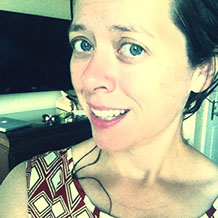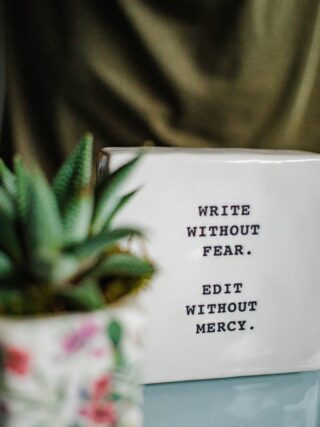 Writer, podcaster, editor, and writing coach, Carrie Jones’s award-winning fiction has been translated into multiple languages, and ended up on both New York Times and international best sellers lists, and she has received the Independent Book Publisher’s Award, Maine Literary Awards and multiple press awards, as well as landing on multiple best book lists. Writing across genres, Carrie was also an award-winning newspaper editor, on-call firefighter, columnist and photographer, received a MFA from Vermont College of Fine Arts, and was awarded the honor of Distinguished Alum. Her podcast, “Dogs are Smarter than People” has been downloaded hundreds of thousands of times and you can find out more about it and her weird, quirky life at here.
Writer, podcaster, editor, and writing coach, Carrie Jones’s award-winning fiction has been translated into multiple languages, and ended up on both New York Times and international best sellers lists, and she has received the Independent Book Publisher’s Award, Maine Literary Awards and multiple press awards, as well as landing on multiple best book lists. Writing across genres, Carrie was also an award-winning newspaper editor, on-call firefighter, columnist and photographer, received a MFA from Vermont College of Fine Arts, and was awarded the honor of Distinguished Alum. Her podcast, “Dogs are Smarter than People” has been downloaded hundreds of thousands of times and you can find out more about it and her weird, quirky life at here.
Work Life Balance by Carrie Jones

Vermont College of Fine Arts is a global community of artists continuously redefining what it means to be an arts college. It is accredited by the New England Commission on Higher Education (NECHE) and offers the Master of Fine Arts degree in a variety of fields, including Writing, Writing for Children & Young Adults, and Writing & Publishing, along with an International MFA in Creative Writing & Literary Translation. With low-residency and fully residential options, VCFA has the graduate program to fit your needs. Learn more at vcfa.edu.
 Writer, podcaster, editor, and writing coach, Carrie Jones’s award-winning fiction has been translated into multiple languages, and ended up on both New York Times and international best sellers lists, and she has received the Independent Book Publisher’s Award, Maine Literary Awards and multiple press awards, as well as landing on multiple best book lists. Writing across genres, Carrie was also an award-winning newspaper editor, on-call firefighter, columnist and photographer, received a MFA from Vermont College of Fine Arts, and was awarded the honor of Distinguished Alum. Her podcast, “Dogs are Smarter than People” has been downloaded hundreds of thousands of times and you can find out more about it and her weird, quirky life at here.
Writer, podcaster, editor, and writing coach, Carrie Jones’s award-winning fiction has been translated into multiple languages, and ended up on both New York Times and international best sellers lists, and she has received the Independent Book Publisher’s Award, Maine Literary Awards and multiple press awards, as well as landing on multiple best book lists. Writing across genres, Carrie was also an award-winning newspaper editor, on-call firefighter, columnist and photographer, received a MFA from Vermont College of Fine Arts, and was awarded the honor of Distinguished Alum. Her podcast, “Dogs are Smarter than People” has been downloaded hundreds of thousands of times and you can find out more about it and her weird, quirky life at here.
Vermont College of Fine Arts is a global community of artists continuously redefining what it means to be an arts college. It is accredited by the New England Commission on Higher Education (NECHE) and offers the Master of Fine Arts degree in a variety of fields, including Writing, Writing for Children & Young Adults, and Writing & Publishing, along with an International MFA in Creative Writing & Literary Translation. With low-residency and fully residential options, VCFA has the graduate program to fit your needs. Learn more at vcfa.edu.
88 Cups of Tea presents Essay & Podcast Series: Intimate Stories from Writers in partnership with our friends at VCFA
There are certain questions people ask me and one of those questions is never, “Carrie, how do you create a work-life balance?”
There’s a reason for that.
Some of my friends think all I do is work. I produce a podcast, create a story on my Patreon, teach at the Writing Barn, edit about thirty stories a month on Reedsy, have created a writing course, and work on my own books.
Some of my other friends ask me, “Do you ever work? Do you make any money at all?” They see me as someone who is pretty happy, socializes with friends two to three times a week, hikes, slogs, and talks about her family and dogs far too much.
Hardly anyone asks me about work-life balance because hardly anyone sees my three-page long to-do lists and organization to create it. They see one aspect of me instead of the other, but the truth is that I have often struggled to find a balance between writing and life and work.
As a writer who once slept in her car in Maine with her dog to keep her warm, I live in constant fear of having to do that again, of being cold and cramped and smelling like a Great Pyrenes. A work-life balance is something that I never thought about for years because the work was my life. The hustle, the constant thinking about story, literature and humanity all blended together in ways that just created one thought: Work was life. Life was work.
Burnout was something Rita Williams-Garcia, novelist and one of my mentors at Vermont College of Fine Arts, warned me about. Your personal life could suffer, she told me. Ideas could dry up. You have to find a balance.
Fear burrowed into me.
“But work is life,” I told her. “Writing is life.”
And I’m pretty sure she said something like, “No. Life is life. Work is part of it. Writing is part of it. But it is not all of it.”
She was right.
During school visits and on book tour, I always tell kids that when a good way of becoming a writer is to live the biggest life you can, to take risks, to watch people, to push your own boundaries so that you can write stories with characters who push their own boundaries. But to do that, you have to give yourself time to live and to find the joy in both the living and the writing. This is true even when sleeping in your Subaru. This is true even in times of crisis.
When I’m writing this, our country is facing a COVID-19 pandemic. People are sheltering in place at home with their loved ones and their not-so-loved ones. Their normal routines are askew. Boundaries are broken. Grocery store trips are the one time they might leave the house for two weeks. And setting a work-life balance seems even more like an impossible mission for many of us when we’re working at home, living at home, and mostly stuck at home if we’re not considered an “essential worker.”
There are some things you can do and remember to try to find that balance again.
Boundaries are Good Things.
Remembering that boundaries are important is the first step. Those boundaries don’t need to be hard and fast walls, but you want to try to understand the structure of your writing day, your business (if your business isn’t writing) and your personal time and create habits that reinforces those set areas of time.
Then you need to tell other people about your boundaries. This is hard when you have a toddler or a needy significant other. It can also be hard to tell yourself. But you have to honor your time to write, time to work at other things, and down time. Don’t let them blend too much into each other.
How I Set Up My Boundaries
Because I live in terror of living in a car again, and I’m the primary wage earner in my house, I work a lot of hours in the day. So I don’t burn out, I work in increments of time each hour, scheduling my time so that it looks like this:
8-8:45 – Respond to emails and Reedsy clients.
8:45-9 – Stand up and do things in the house.
9-9:45 – Read Sami’s packet, Read Mark’s packet.
9:45-10 – Paint.
10-10:45 – Work on ANOTHER NOW revision.
I do this all day until it’s time to make dinner. It’s super regimented, but it’s the only way I can make myself have a balance between work time and family time and writing time and self time. And it works for me. It might not work for you. I take a half hour break every day to run or bike too.
Know When To Break The Rules
All writers have heard the adage “rules are made to be broken” and we usually apply that to inserting an adverb or the passive voice in our work. But the adage is true about balance and boundaries too. It’s even true about schedules like mine.
Emergencies happen. Don’t be so reliant on boundaries that you can’t respond to situations that need immediate responses.
Opportunities also happen. Don’t be so reliant on your boundaries that you can’t grab those opportunities for learning, for adventure and for joy. If someone offers you a box of chocolates and you like chocolates, you don’t have to just stare at the chocolates and murmur, “Must work. Must not have chocolates. Must work.” Allow yourself to have joy and take a chocolate. Then get back to your boundaries and writing.
Create Consistent Habits.
Build your balance piece by piece, looking towards consistency. Set a habit to write every day or read every day or revise every day. Set another habit to work on other business for set times, to interact with friends and family at other times.
More than that though, you have to respect those habits, reinforce your needs for balance, and be your own task master for things in all the segments of the world that you’re trying to find time for.
Put Yourself in Time Out
If you’re working from 7:30 a.m. to 9:30 a.m., you’re possibly going to burn out or your personal life is going to suffer. It’s okay to press pause, take deep breaths, and focus on the areas of your life that you’ve been blowing off.
Schedule in personal time the way we’ve all become adept at scheduling in Zoom meetings. The opposite is also true. If all you’ve been doing is binging Tiger King and obsessing about mullets, schedule time to write. Writing is like all other art and craft, you become better at it, the more that you do it.
Scheduling out your balance makes you less stressed about balance.
Remember that your definition of balance might not be the same as everyone else’s definition.
Michelle Obama said, “Women in particular need to keep an eye on their physical and mental health, because if we’re scurrying to and from appointments and errands, we don’t have a lot of time to take care of ourselves. We need to do a better job of putting ourselves higher on our own ‘to do’ list.”
Prioritizing what parts of your life you want to focus on is a key step for all of us writers and our schedules and priorities are not going to all be identical. But figuring out what you want to achieve and what you enjoy doing are really important to achieving that balance between family and writing and work and our personal lives.
According to an article on cleverism.com by writer Martin Luenendonk, part of understanding when we have balance according to is “when you can objectively say that you were able to achieve and enjoy something with your family and friends. When you were able to achieve and enjoy something for yourself. When you were able to achieve something at work, doing a job that you enjoy doing.”
For some of us that might feel like an impossible dream. It doesn’t need to be. Luenendonk gives practical steps to head towards that balanced place.
Write down what you do.
In a notebook or a computer file, write down every active thing you have to do in the upcoming week. Then look at this and create a schedule so that you can figure out where to balance your time and get ready.
Give yourself time for play.
When you look at that schedule, put in time for yourself, for your family and friends, and for your writing.
Be efficient
Find ways to structure your tasks that maximize your time and efficiency.
Schedule Blank Time
Yes, that’s right. Put in time on your schedule where you do nothing. Fill that time when you get there with what you need to do, want to do, or something absolutely random like Googling, “hamsters’ eye color” for a half hour.
Marissa Mayer, president and CEO of Yahoo said, “Find your rhythm, understand what makes you resentful, and protect it. You can’t have everything you want, but you can have the things that really matter to you. And thinking that way empowers you to work really hard for a really long period of time.”
Get rid of things that are pointless
Once you have a schedule up and running for a bit, get rid of the activities and goals that make you unhappy or don’t help your life or your writing. If you still have to do those things (think scrubbing the toilet), try to spend as little time as possible on them.
Remember though, that writing, your craft, your art, your need to communicate through story? That’s not pointless and neither are you. Make your needs a priority and do what you need to meet those needs.
“You don’t have to make yourself miserable to be successful. It’s natural to look back and mythologize the long nights and manic moments of genius, but success isn’t about working hard, it’s about working smart.” ―Andrew Wilkinson, founder of MetaLab
That’s true about writing, too, and it’s something that a lot of us writers have to remind ourselves every month, every week, and sometimes every day.
 Writer, podcaster, editor, and writing coach, Carrie Jones’s award-winning fiction has been translated into multiple languages, and ended up on both New York Times and international best sellers lists, and she has received the Independent Book Publisher’s Award, Maine Literary Awards and multiple press awards, as well as landing on multiple best book lists. Writing across genres, Carrie was also an award-winning newspaper editor, on-call firefighter, columnist and photographer, received a MFA from Vermont College of Fine Arts, and was awarded the honor of Distinguished Alum. Her podcast, “Dogs are Smarter than People” has been downloaded hundreds of thousands of times and you can find out more about it and her weird, quirky life at here.
Writer, podcaster, editor, and writing coach, Carrie Jones’s award-winning fiction has been translated into multiple languages, and ended up on both New York Times and international best sellers lists, and she has received the Independent Book Publisher’s Award, Maine Literary Awards and multiple press awards, as well as landing on multiple best book lists. Writing across genres, Carrie was also an award-winning newspaper editor, on-call firefighter, columnist and photographer, received a MFA from Vermont College of Fine Arts, and was awarded the honor of Distinguished Alum. Her podcast, “Dogs are Smarter than People” has been downloaded hundreds of thousands of times and you can find out more about it and her weird, quirky life at here.
Vermont College of Fine Arts is a global community of artists continuously redefining what it means to be an arts college. It is accredited by the New England Commission on Higher Education (NECHE) and offers the Master of Fine Arts degree in a variety of fields, including Writing, Writing for Children & Young Adults, and Writing & Publishing, along with an International MFA in Creative Writing & Literary Translation. With low-residency and fully residential options, VCFA has the graduate program to fit your needs. Learn more at vcfa.edu.











